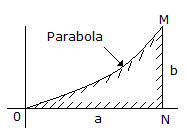Civil Engineering :: Applied Mechanics
-
The centre of gravity of a triangle is at the point where three
-
The forces which meet at one point and have their lines of action in different planes are called
-
At a given instant ship A is travelling at 6 km/h due east and ship B is travelling at 8 km/h due north. The velocity of B relative to A is
-
The equation of motion of a particle starting from rest along a straight line is x = t3 - 3t2 + 5. The ratio of the accelerations after 5 sec and 3 sec will be
-
The locus of the instantaneous centre of a moving rigid body, is
-
A projectile is thrown at an angle a to the horizontal with α velocity v. It will have the maximum centripetal acceleration
-
The c.g. of the shaded area of the below figure whose curve OM is a parabola from y-axis, is

-
If a body moves in such a way that its velocity increases by equal amount in equal intervals of time, it is said to be moving with
-
. If the gravitational accelerational at any place is doubled, the weight of a body, will


 Whatsapp
Whatsapp
 Facebook
Facebook

